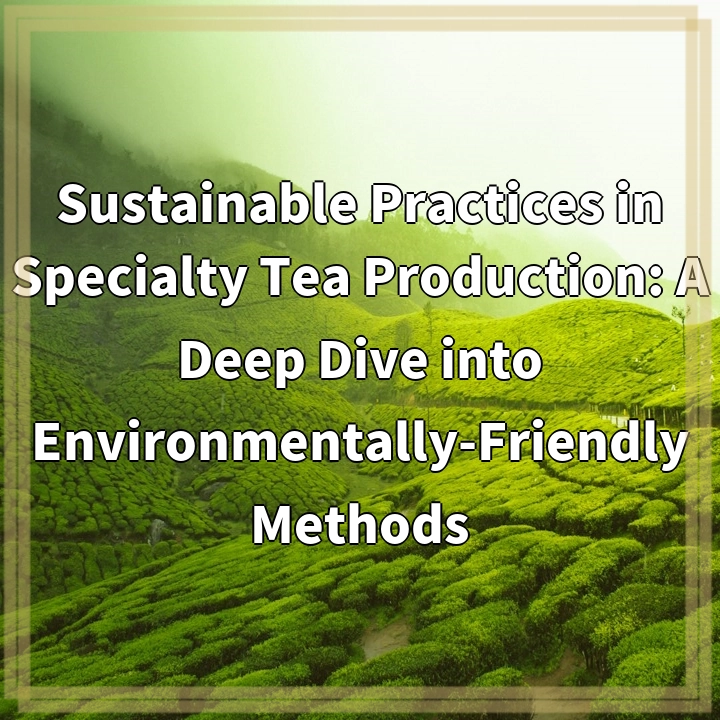
What are Sustainable Practices in Specialty Tea Production?
Sustainable practices in specialty tea production refer to environmentally-friendly methods and approaches used in the cultivation, harvesting, processing, and distribution of specialty tea. These practices aim to minimize the negative environmental impacts, conserve resources, promote biodiversity, and ensure the long-term viability of tea production.
The Real-World Problems Associated with Unsustainable Tea Production
Unsustainable tea production can have several detrimental effects on the environment and local communities. These problems include:
1. Soil Degradation
Intensive use of synthetic fertilizers and pesticides can lead to soil degradation, erosion, and nutrient depletion. This negatively affects the fertility and long-term productivity of tea plantations.
2. Water Pollution
Improper disposal of agrochemicals and processing waste can contaminate water sources, harming aquatic ecosystems and potentially affecting human health. Many conventional tea plantations lack proper wastewater management systems, exacerbating this issue.
3. Deforestation
Clearing large areas of land for tea plantations often involves deforestation, leading to the loss of valuable habitat for numerous plant and animal species. Deforestation also contributes to climate change by reducing carbon sequestration and increasing greenhouse gas emissions.
4. Loss of Biodiversity
Conventional tea production methods, including the use of monoculture plantations, can lead to a loss of biodiversity. By contrast, sustainable tea production practices prioritize the preservation of natural ecosystems, promoting habitat restoration and the protection of native flora and fauna.
5. Social and Economic Challenges
Unsustainable tea production can often exploit workers through poor working conditions, low wages, and limited access to healthcare and education. Fair and ethical labor practices are essential to address these social and economic challenges and ensure a more sustainable tea industry.
In conclusion,
Implementing sustainable practices in specialty tea production is vital to mitigate the environmental impact of the tea industry and address the real-world problems it faces. By adopting eco-friendly cultivation methods, supporting biodiversity conservation, and promoting fair trade practices, we can enjoy our favorite cup of specialty tea while protecting the planet and supporting the well-being of local communities.

Solutions for Sustainable Specialty Tea Production
To combat the real-world problems associated with unsustainability in tea production, the industry can implement the following solutions:
1. Organic Farming Practices
Embracing organic farming practices eliminates the use of synthetic fertilizers and pesticides, reducing soil degradation and minimizing chemical runoff into water sources. Organic farming also promotes the natural balance of ecosystems and supports healthy soil biodiversity.
2. Water Conservation and Management
Implementing efficient irrigation systems, proper wastewater management, and monitoring water usage can help minimize water pollution and limit the negative impact on aquatic ecosystems. Rainwater harvesting and other water-saving techniques can also be employed.
3. Sustainable Land Management
Adopting agroforestry practices, such as intercropping tea plants with shade trees or incorporating natural vegetation buffers, can help prevent deforestation. These approaches protect biodiversity, enhance carbon sequestration, and create more resilient and sustainable tea plantations.
4. Supporting Biodiversity Conservation
Promoting biodiversity in tea plantations involves protecting and restoring natural habitats, creating wildlife corridors, and encouraging the growth of native plant species. This supports ecological balance, enhances pollination, and provides habitat for beneficial insects and birds.
5. Fair Trade and Social Responsibility
Engaging in fair trade practices ensures that tea workers receive fair wages, access to healthcare, and education opportunities. Ethical labor practices and partnerships with local communities contribute to sustainable social and economic development.
In conclusion,
By adopting these solutions, the specialty tea industry can move towards greater sustainability. These practices not only minimize environmental damage but also contribute to more resilient and socially responsible supply chains. Supporting sustainable specialty tea production enables us to enjoy our favorite teas while making a positive impact on the environment and the communities involved in its production.















